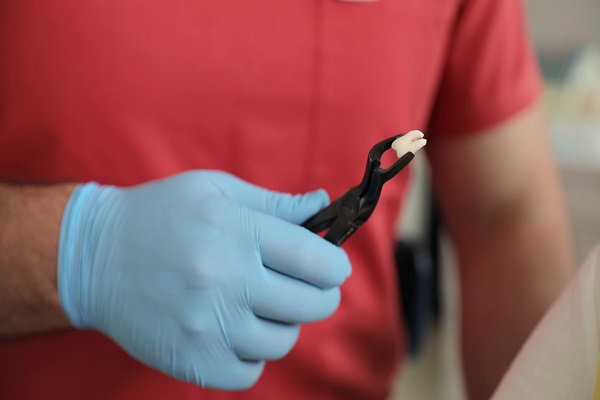When Would a Dentist Recommend a Tooth Extraction?
is typically used as a last resort when a tooth is too damaged to be repaired. Wisdom teeth are the exception to this practice because they are the only set of teeth that most people do not need. However, dentists often recommend extracting wisdom teeth even if they are healthy, and it is typically the first option explored when something goes wrong with a wisdom tooth.
Reasons for tooth extraction
Tooth extractions are often necessary dental procedures, especially when they affect surrounding teeth, gums, and bones. They may sound intimidating, but extractions are common and provide many benefits in keeping the oral cavity healthy. A variety of tooth-replacement options are available, including tooth-colored crowns that keep patients' smiles in line. With proper care and maintenance, tooth replacements can last up to a decade. We encourage all patients to read and understand the tooth extraction procedure before coming to their appointment.
There are multiple reasons a dentist might recommend a tooth extraction. Reasons include creating space in a patient's jaw, removing a tooth that is too damaged to be saved, and preventing a severe tooth infection from spreading to other parts of the body. Additionally, the dentist may need to remove the few teeth left on a dental arch so the patient can explore missing teeth solutions like dentures and implant-supported dentures.
Signs and Symptoms of a Compromised Tooth
Many patients are unaware that their tooth requires extraction until a dentist tells them. However, in most cases, certain signs and symptoms present themselves well before the need for extraction. It is important to recognize these signs to help avoid more complications.
Common signs and symptoms of a tooth requiring extraction:
- A loose tooth
- An impacted baby tooth
- Difficulty or pain when chewing
- Jaw pain, soreness, or stiffness
- Spacing or overcrowding issue
- Swollen gums or jaw
- The tooth or gum tissue surrounding a tooth is infected or inflamed
Patients experiencing these symptoms should immediately contact their dental provider to schedule an examination. We can discuss an effective course of action and recommend alternative treatments for those unable to undergo an extraction.
How dentists perform a tooth extraction
There are two main types of dental extractions: simple and surgical. We perform a simple extraction when enough is left of the tooth to pull it out with forceps. A surgical extraction is performed when the tooth is stuck underneath the gums or bone tissues. The dentist will have to make an incision into the patient's gum tissues to reach the tooth, pull it out, and suture the area. Surgical extractions have a longer recovery period because an incision is made into the gum tissues.
Local anesthetics are administered during extractions so patients do not feel pain while the dentist works on their mouth. However, they may experience some pain and discomfort once the anesthetic starts to wear off. Therefore, dentists often provide their patients with prescription painkillers to help manage any pain experienced during recovery.
Life after tooth extraction
It can take up to two weeks to recover from an extraction. However, the first week is the most crucial period because the blood clot that forms on the extracted tooth's socket is most vulnerable at this time. In addition, the blood clot falling out of its socket leads to a painful condition known as dry socket, which lengthens the recovery period. Simple things that patients can do to help make their recovery smoother include:
- Avoid eating, drinking, or talking for the first few hours after tooth extraction.
- Stick to liquid and soft foods for the first week after the procedure.
- Avoid sucking, such as drinking through straws, spitting, or smoking.
- Avoid brushing and using oral hygiene products for the first two days after an extraction; rinse the mouth with a saltwater solution.
- Use any painkillers or antibiotics prescribed as recommended by the dentist.
- Avoid strenuous activities for the first two days after having a tooth extracted.
- Aim to get as much rest as possible.
- Do not touch or irritate the extraction site, as that can dislodge the blood clot in the socket.
Extractions protect your health
Do you need to have a tooth pulled? Our team has you covered. We may diagnose and recommend a tooth extraction after an initial consultation or examination. Then, we can help you get back on track to building and maintaining a healthy mouth and bright smile. Give us a call at {{PHONE}} or stop by our Bryan clinic to set up an appointment.
Please request an appointment here: https://www.riversdentistry.com or call Rivers Family Dentistry at (979) 710-2216 for an appointment in our Bryan office.
Check out what others are saying about our dental services on Yelp: .
Related Posts
If you are considering a wisdom teeth removal in Bryan, call our office and schedule a consultation. Not everyone needs to have their wisdom teeth removed. If there is room in your mouth for this third set of molars and they grow in properly, you could continue to live with them without experiencing any irritation.…
When dentures break, patients may have difficulty with daily activities, such as speaking and eating. Do not wait until your next regular dental appointment to address this issue. If you cannot be seen in a timely manner, an emergency dentist can help patients restore their dentures as quickly as possible.Dentures are usually durable but do…
The effects of sensitive teeth are not limited to inconvenience during meals. Tooth sensitivity can be a symptom of a bigger problem with the potential to affect your general health. Thankfully, this is not always the case. Keep reading to find out the different causes of tooth sensitivity. Some causes suggest issues that could potentially…
Infection and swelling mean that you have a major problem in your mouth that needs emergency dentistry, so you should seek a dentist right away. Dental emergencies can change the course of your life when it comes to your face and smile. If you prioritize seeing a dentist right away, it can save you tons…


